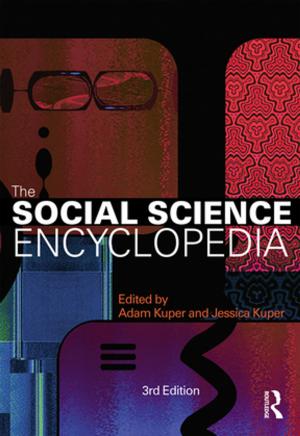Sustainability
If It's Everything, Is It Nothing?
Nonfiction, Social & Cultural Studies, Political Science, International, International Relations, Politics, History & Theory| Author: | Heather M. Farley, Zachary A. Smith | ISBN: | 9781136009365 |
| Publisher: | Taylor and Francis | Publication: | August 15, 2013 |
| Imprint: | Routledge | Language: | English |
| Author: | Heather M. Farley, Zachary A. Smith |
| ISBN: | 9781136009365 |
| Publisher: | Taylor and Francis |
| Publication: | August 15, 2013 |
| Imprint: | Routledge |
| Language: | English |
Humans are not living within our ecological means. We are using the earth’s resources at a pace that cannot be maintained. We have already seen evidence of the fallout associated with ecological overconsumption and continued abuse of environmental systems will create increasing challenges both today and into the future. Our depletion of natural systems minimizes the possibilities available to future generations who are expected to somehow rely on innovation and ingenuity for their survival. Yet, despite the challenges we face, governments, individuals, non-profits, educational institutions, and corporations are all heralding the promise of sustainable development to save our environmental systems from collapse while allowing for uninterrupted economic growth.
Today, the concept of sustainability is a widespread goal that nearly everyone supports. At the same time, almost no one means the same thing when they use the term. Sustainability is so broad and overly used that it seems to mean everything to everyone. The result is that the concept has lost its meaning. In this book, the authors examine the misuses and abuses of "sustainability" and seek to refine and clarify the concept. The authors offer a new definition of sustainability – what they call neo-sustainability – to help guide policies and practices that respect the primacy of the environment, the natural limits of the environment, and the relationship between environmental, social, and economic systems.
Humans are not living within our ecological means. We are using the earth’s resources at a pace that cannot be maintained. We have already seen evidence of the fallout associated with ecological overconsumption and continued abuse of environmental systems will create increasing challenges both today and into the future. Our depletion of natural systems minimizes the possibilities available to future generations who are expected to somehow rely on innovation and ingenuity for their survival. Yet, despite the challenges we face, governments, individuals, non-profits, educational institutions, and corporations are all heralding the promise of sustainable development to save our environmental systems from collapse while allowing for uninterrupted economic growth.
Today, the concept of sustainability is a widespread goal that nearly everyone supports. At the same time, almost no one means the same thing when they use the term. Sustainability is so broad and overly used that it seems to mean everything to everyone. The result is that the concept has lost its meaning. In this book, the authors examine the misuses and abuses of "sustainability" and seek to refine and clarify the concept. The authors offer a new definition of sustainability – what they call neo-sustainability – to help guide policies and practices that respect the primacy of the environment, the natural limits of the environment, and the relationship between environmental, social, and economic systems.















